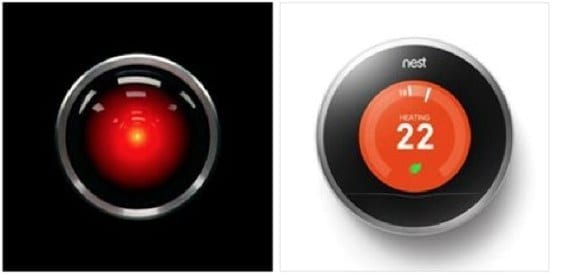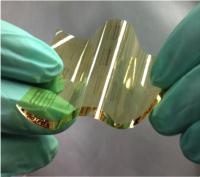
Once upon a time, a car was an industrial machine you climbed in and drove around.
Today, it’s also a tracking and nudging machine that second-guesses you for your own good. It reminds you to fasten your seat belt and makes sure you don’t lock yourself out, and it contains a “black box,” much like a jetliner’s, that records direction, speed, seatbelt position and other details. Soon, cars will go beyond giving advice, and drive themselves (already legal in three states). Eventually they will be so good at driving that (as Gary Marcus has noted) it will be illegal and immoral for you to take the wheel. Meanwhile the “Internet of Things” will have knitted that future car into a network of other devices and apps—the retailers that sell you stuff, the house whose thermostats, smoke detectors and appliances know you inside and out. (That’s the “conscious home” that Nest is working toward, as its founder wrote Monday in a post on the startup’s acquisition by Google.)
Personal tech is just the shiny edge of a broader change. We are heading quickly toward an “Other Knows Best” world, in which everything and everybody second-guesses you for your own good. That may be a world of easier shopping and friction-free government, better health and safer lives (thank you, surveillance cameras). It will certainly be a world of sharply reduced personal autonomy.
Autonomy is often described as personal self-government, or “the condition of being self-directed,” as the philosopher Marina Oshana has put it. But after your car drives itself, your refrigerator tracks the milk and egg supply, City Hall imperceptibly nudges you towards the “right choice,” your favorite stores tell you what you want to buy, and you have outsourced your willpower to apps and wearable gadgets that tell you to eat salad and go to the gym—what is left for you to direct? The scope of self-government is shrinking, and that is going to alter people’s relationship with the state, with business, and with each other.
Already, businesses, with more knowledge about you on their servers than could ever fit in your own head, are using that data to figure out what you might buy before you think about it. And those businesses also have a bead on your innate biases and predilections—those habits of thought and action that you can’t help—which they’ll use, again, to get you to spend (as a consumer) and to cooperate (as an employee). Because we’re greatly influenced by other people in our social networks, for example, Facebook may make sure you know that a pal of yours likes a restaurant’s FB page, oruse your photo in an ad displayed to one of your friends. Because we can be motivated by reactions we aren’t aware of, Campbell’s soup included biometric measurements of consumers in its research for a label re-design.
And the “Other Knows Best” world is also, of course, a place where government uses the same techniques as business to get you to save water, recycle, pay your taxes on time and engage in other “pro-social” behaviors with less pain to you and less cost to the authorities. That’s the promise (or peril, if you prefer) of the boom in “nudge”- type regulations.
The Latest on: Personal Autonomy
[google_news title=”” keyword=”Personal Autonomy” num_posts=”10″ blurb_length=”0″ show_thumb=”left”]
via Google News
The Latest on: Personal Autonomy
- The Future Of EV Infrastructure Is All About Convenienceon May 10, 2024 at 6:15 am
The landscape of personal transportation is undergoing a seismic shift, and if you're fixated solely on the fastest-charging technology, you might be left in the dust.
- GriffinAI Launches in Switzerland: Revolutionizing AI Agents with On-Chain Autonomy and Collaborationon May 10, 2024 at 5:30 am
VADUZ, LIECHTENSTEIN / ACCESSWIRE / / GriffinAI, launched in Switzerland by crypto veteran Oliver Feldmeier, aims to enhance AI Agents capabilities by integrating them into a secure, decentralized ...
- Innoviz: For BMW, Level 3 autonomy is hereon May 7, 2024 at 2:11 am
Elad Hofstetter Chief Business Officer at Innoviz, updates Just Auto on the latest autonomous vehicle (AV) tech it supplies to BMW ...
- How teacher autonomy helps students and staff succeed at this top Florida schoolon May 6, 2024 at 4:07 am
Teachers at A.D. Henderson School, a small public school on the campus of Florida Atlantic University, Henderson in Boca Raton, attribute their academic success to their autonomy.
- At Florida school, teacher autonomy leads to classroom excellenceon May 5, 2024 at 9:07 pm
Teachers at a Florida public school say the creativity they are allowed in the classroom is why their students excel on the state's standardized tests.
- Dear Annie: Employee who appreciates autonomy feels like she’s ‘under a microscope’ with new manageron May 2, 2024 at 2:30 pm
I’ve considered bringing up my concerns with her directly, but I worry about pushback or coming off as resistant to change.
- FDA-approved surgical robots trend toward autonomy, study findson April 29, 2024 at 6:24 pm
A systematic review in npj Digital Medicine categorizes FDA-approved surgical robots by their levels of autonomy, highlighting a need for standardized definitions and greater regulatory clarity as ...
- Stop denying women their bodily autonomyon April 28, 2024 at 9:09 pm
I want to write this piece to express my disappointment in the regressive state of laws regarding women in the U.S. Three weeks ago, on April 9, the Arizona Supreme Court reinstated a Civil War-era ...
- California lawmaker drops assisted suicide expansion after bipartisan outrageon April 17, 2024 at 5:00 pm
“While I have compassion for those desiring further change, pushing for too much too soon puts CA & the country at risk of losing the gains we have made for personal autonomy,” Eggman said on X.
- The Detrimental Implications of Being a 'Trad' Wife or 'Kept' Wifeon March 20, 2024 at 10:17 am
and personal autonomy. While these lifestyles may appeal to some for their traditional values or perceived stability, they carry significant implications for women's financial well-being and autonomy.
via Bing News









